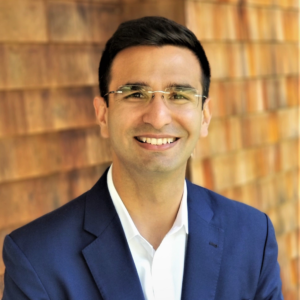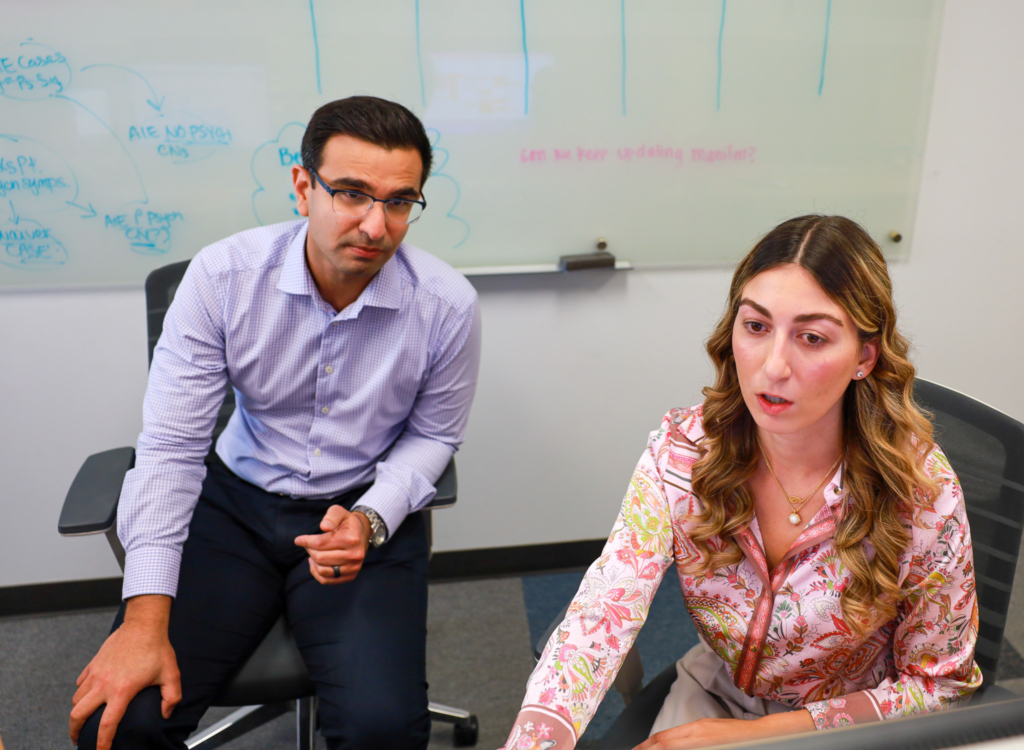DECIPHERING THE NERVOUS SYSTEM’S SECRETS
Partnering to Solve a Medical Mystery
The patients would arrive at the hospital presenting with puzzling and sudden cognitive decline—including psychosis in some cases—the result of the rapid onset of what doctors assumed was some kind of atypical presentation of schizophrenia that did not respond to treatment. Leaving patients hospitalized indefinitely and telling the families that there was nothing left to be done for their loved ones seemed to be the only solution.
This diagnosis never sat right with Anthony Zoghbi, M.D. ’13, who witnessed these patients in his early years of training. The speed of onset and the lack of certain conventional markers of schizophrenia in these patients troubled him, as did the inability to effectively treat them.
“It’s honestly quite frightening to think of the fact that your body might, for reasons that we don’t fully understand, just turn against you with symptoms so severe that you could end up institutionalized or in a hospital for the rest of your life,” Dr. Zoghbi said.
He was frustrated but determined to find a better answer for these patients. During his residency at Columbia University, Dr. Zoghbi and his colleagues began to investigate an intriguing hypothesis: what if these cases were not actually schizophrenia but some kind of undiagnosed autoimmune condition that could be treated not with psychiatric medicines but with immunosuppressants?
Surprisingly, it worked. Dr. Zoghbi saw early success with some of these patients, one of whom was a former high school valedictorian who had been institutionalized for 26 years with this “atypical” schizophrenia and who showed substantial improvement in her condition after just five days of steroid treatment.
“These experiences opened my eyes to a couple of incredible possibilities,” Dr. Zoghbi said.
In 2021, Dr. Zoghbi arrived at Baylor and applied this experience to treat similar cases at Ben Taub Hospital, which is Houston’s largest safety-net hospital and is staffed by Baylor physicians. Since then, he and his team have treated a significant number of these cases, enough that they have developed a risk calculator to help health providers recognize red flags to better triage such patients. And while he had big plans to design a study to formally examine these cases that seemed to challenge the conventional understanding of psychiatry and neurology, Dr. Zoghbi knew that securing funding for something that might seem far-fetched would be difficult.
The Valour Foundation believed in his vision. As an organization committed to advancing medical research focused on developing quality, accessible treatments for mental illness, the Foundation’s support has enabled Dr. Zoghbi and his team to increase awareness of these autoimmune conditions and establish collaborations to change clinical practice for these patients in the Harris Health System and at Baylor St. Luke’s Medical Center, Texas Children’s Hospital, Memorial Hermann and UTHealth Houston.
Most critically, the Valour Foundation’s support has helped Dr. Zoghbi and his team lay the groundwork for developing a diagnostic test in the future, which could offer an immediate treatment option to improve patients’ symptoms substantially and give them back their lives.
“The Valour Foundation is pleased to support Dr. Anthony Zoghbi’s innovative research into diagnosing and treating people with unexplained causes of dementia and cognitive impairment,” a Foundation representative said. “His research offers realistic hope for significant recovery to many people with severe, longstanding neurobehavioral and emotional disabilities that, heretofore, were refractory to treatment.”
FEATURED FACULTY

Anthony W. Zoghbi, M.D. ’13
Assistant Professor
Menninger Department of Psychiatry and Behavioral Sciences
Department of Molecular and Human Genetics
Chief, Psychiatric Genetics
Menninger Department of Psychiatry and Behavioral Sciences
Beth K. And Stuart C. Yudofsky Scholar in Behavioral Neuroscience



